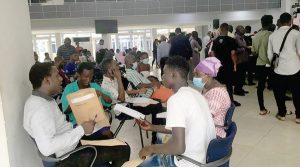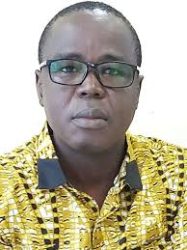Uncertainty, suspicion and perhaps corruption have clouded the 2025 Senior High School placement across the country.
For several weeks many parents and caregivers have invaded the premises of the Ghana Education Services and the Computerised School Selection and Placement System (CSSPS) to demand fairness and equity in the placement of their children.

As was expected, large numbers of parents have been gathering at placement centers to demand explanations for the strange placements of their children. In many cases students were placed outside their home regions, which are several kilometers from where they are living.
What is more, some of the students placed far from their hometowns were placed as day students. If not rectified, poor parents will be compelled to hire private accommodation for their young children who are not mature enough to live on their own.
Placements
It is the aspiration of parents to have their children placed in their first or second choice schools, which comprise category A and B schools. These schools are the best and once children are enrolled in any of the schools, it is guaranteed that they would qualify for admission to tertiary schools of their choice.
According to date from the Ghana Education Service, out of the 590,000 candidates who qualified for placement this year, more than 107,000 missed out on automatic school placement under the CSSPS. These student must therefore complete self-placement to secure admission to the remaining secondary schools.
In previous years, the number of unplaced children was about 20,000, which indicates that many children got their first or second choices, irrespective of their aggregate. This was part of the previous government’s policy to admit children from deprived schools and communities to category A schools.
Against this background, the huge number of 107,000 not placed in their first or second choice has raised concerns over favouritism, nepotism and corruption. Many parents suspect that the high number of children not placed has paved the way for school placement contractors, mostly politicians and some staff of the Ghana Education Service and Ministry of Education to sell the vacancies in the top schools to the highest bidders.
At the time of writing this article, social media was buzzing with allegations that school placement contractors were charging between 10,000 to 15,000 cedis for placement to some category A schools, such as Presec, Welsey Girls, Holy Child, Opoku Ware, Prempeh College, Achimota College, St. Mary, Aggrey Memorial, Mfantsepim and Adisadel to mention a few. One parent is alleged to have paid 25,000 cedis to get admission for his daughter at Achimota School.
It is also alleged that a child who obtained aggregate 28 got admission to St. Augustine College because his parents paid, while another child who obtained single digit of nine was denied admission to the same school. The alleged selling of placements to the highest bidders constitutes the highest level of corruption that has characterized this year’s event. In fact, corruption is at its worst when it denies poor and marginalized people equal access to social services like education, primary health care and water and sanitation.
GES dismisses accusations
The Ghana Education Service (GES) has however, dismissed reports that cut-off points were used in the ongoing school placement process. In a statement, GES explained that the placement of candidates was based on the raw scores, in addition to the level of subscription or competitiveness of a school, the demand for a particular course, the candidate’s aggregate, residential preferences, such as day or boarding, and catchment area considerations.
Amid the uneasiness, the Greater Accra Minister, Linda Akweley Ocloo advised parents whose children did not get their preferred schools to consider hiring teachers to offer extra classes to their children. This somewhat insensitive response from a Minister further irritated the parents and their children, who believe that some vacancies have been reserved for sale to the rich parents.
It is sad that the ruling National Democratic Congress (NDC), which is aligned to social democratic ideology tends to marginalize the very poor and rural people who vote for it. This marginalization is quite evident in its failure or reluctance to provide equal educational opportunities for both rich and poor children.
Free SHS canceled cut-off points
Several years before the introduction of the free Senior High Secondary (SHS) policy in 2017, there was a cut-off point of aggregate 20 and below for a child to be admitted to secondary school. The cut-off point denied millions of children the benefit of secondary education and eventually the benefit of tertiary education.
However, the free SHS policy introduced in 2017 redefined basic education to terminate at the secondary level, which made it mandatory for every child between 15 and 18 years to have free secondary education.
The policy subsequently reversed the cut-off point and made admission to secondary school a near universal right, but on condition that every child obtains at least a credit in English and Mathematics. Thus, children who obtained 30 and above got admission, while measures were made to provide them with extra tuition to catch up.
Between 2017 and 2024 an additional 1.7 million children who were sidelined by the cut-off point got the benefit of secondary education. These children were previously selling on the streets because their parents could afford to pay for secondary education.
Inclusive education
The free SHS policy ensured that access to secondary education was inclusive, rather than exclusive as could be happening now. The inclusive policy brought children from deprived schools, poor homes and rural communities into contact with children from prestigious urban schools and rich families. It was a way of getting children from diverse backgrounds to meet at the secondary school level, where all social and religious barriers were removed.
It was anticipated that children from rich and poor, rural or urban backgrounds would bond and build networks from secondary to tertiary level and even compete on the job market on equal terms. That was the surest way to develop our future leaders with equal access to educational opportunities.
Election promise
During the 2024 election campaign, not only did President John Mahama promise to sustain the free SHS policy, but he also promised to improve it from what he inherited. Certainly, the failure to place more than 100,000 students in his first year in office could amount to breaking the social contract he had with the electorate.
While the country has no doubt made some gains in secondary school enrolment, the GES and the Ministry of Education need to ensure fair and equitable distribution of schools for children from both rich and poor homes and urban and rural areas. In addition, equal access to secondary education will uphold the principle of non-discrimination in the distribution of social interventions.
SDGs
As Ghana seeks to make gains in the Sustainable Development Goals (SDGs) access to quality basic education should not be a question of the ability of parents to pay but more about the rights of children to enjoy quality basic education.
Sustainable Development Goal (SDG) 4 focuses on education, aiming to “Ensure inclusive and equitable quality education and to promote lifelong learning opportunities for all” by 2030. This goal includes targets such as ensuring all girls and boys complete free, equitable, and quality primary and secondary education and have access to quality early childhood development.
Ghana has a long-standing tradition of progressive public policies that aim to make education more inclusive, such as providing free textbooks, boarding, and meals, despite the fiscal burden. These policies must not be sacrificed on the altar of the inability of the government to fund basic education.
If the previous government funded free SHS, the current government has no excuse. Progressive countries in the developing world, especially China and India invested in inclusive technical and vocational education for all children and youth, irrespective of inability of parents to pay. The result is the technological advancement that India and China have unleashed on the world.
International recognition
As Ghana is being recognised internationally for making the right policies and investing in education, care should be taken not to sideline poor children from benefiting from the country human resource development.
A 2024 study on the quality of education and investments in educational infrastructure recognized Ghana for its strong education system. Ghana was ranked the best country for education in West Africa and fifth in Africa in the 2024 Best Countries for Education rankings. The rankings are as follows: (1) South Africa (39th) (2) Egypt (41st) (3) Morocco (55th) (4) Kenya (71st) (5 ) Ghana (73rd) Sources (Business Insider Africa)
At the tertiary level, Ghana is recognized for its high investment in education in West Africa. The traditional universities like University of Ghana, Legon, Kwame Nkrumah University of Science and Technology, Kumasi, University of Development Studies, Tamale, University of Cape Coast and the University Education, Winneba, are among the top 20 ranking universities in Africa.
Apart from that, Ghana boasts of quality technical universities that are providing courses in technical subjects to feed the industrial sector. As a result, Ghana has become the destination for African youth seeking opportunities for quality tertiary and technical education. The recent achievement of the University of Development Studies as the world’s best university football team has enhanced the brand of Ghana’s universities in sports.










